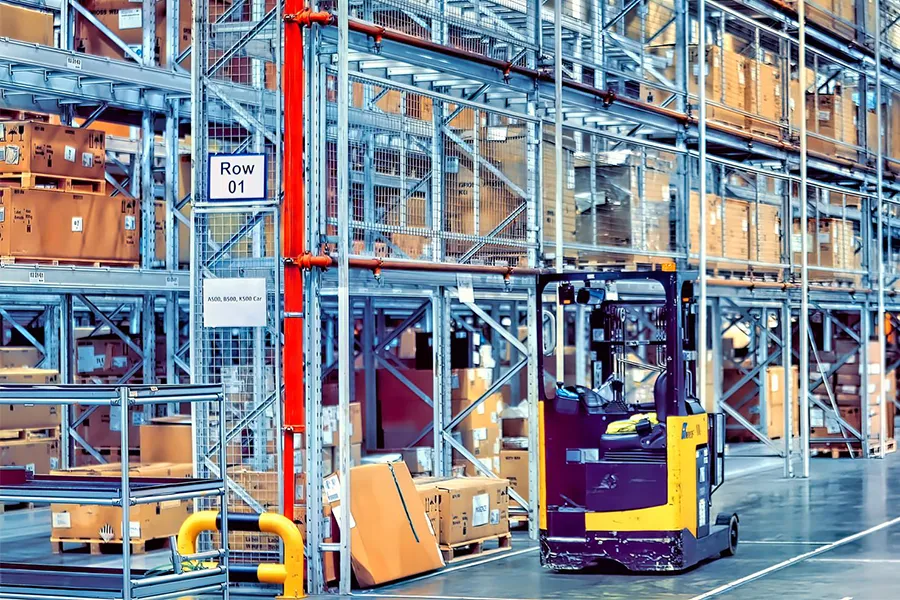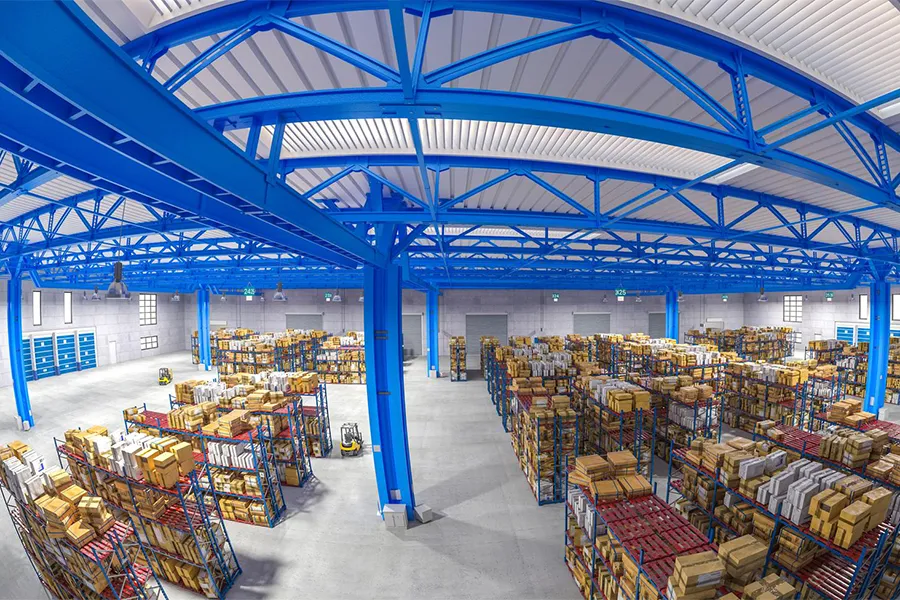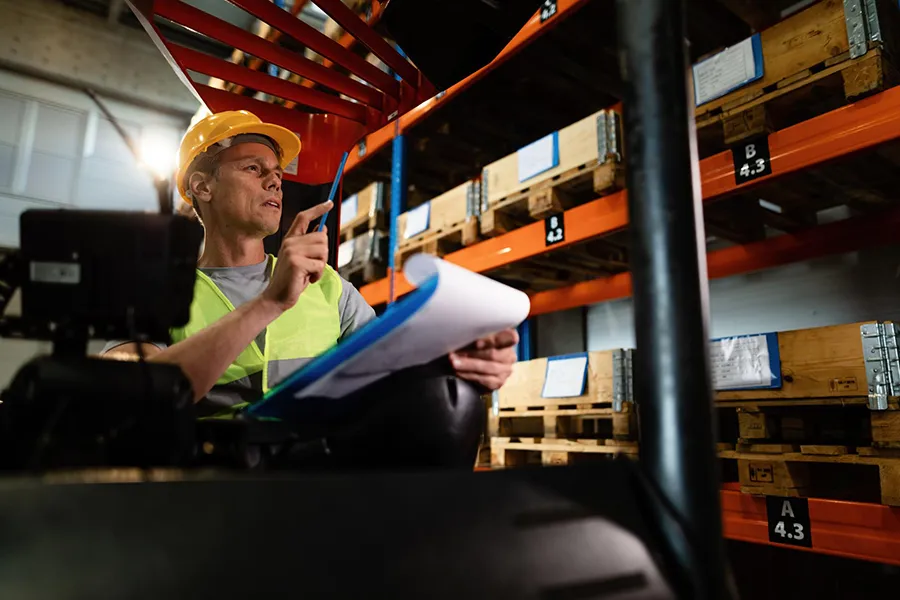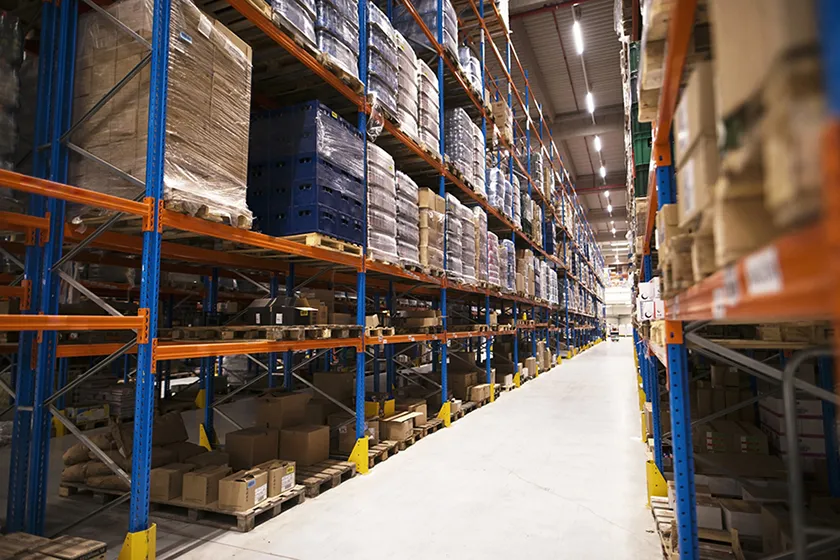Industrial warehousing plays an important role in the supply chain and production processes in various industries, specifically in the storage and management of semi-finished parts and finished products, and plays a vital role in continuous production and meeting market needs. Proper warehouse design, use of modern technologies, accurate inventory management, reduction of storage and transportation costs, etc., are among the benefits that will have a high impact on improving business performance and reducing costs on a large scale. In this article, the principles and criteria of industrial warehousing, its applications, and the impact of modern technologies in optimizing goods warehousing systems are examined.

Industrial Warehousing
Industrial warehousing is a type of warehousing service that deals with the storage, management and distribution of materials, semi-finished products or industrial goods and covers all activities related to an industry from production to final storage of goods. The main goal of industrial warehousing is to optimize the flow of goods and products in the supply chain, manage warehouses and distribution systems in various industries, and also reduce storage costs.
In the warehousing industry, topics include:
- Design and construction of suitable warehouses for industrial goods
- Inventory management of industrial warehouses
- Delivery planning and scheduling
- Optimization of goods warehousing methods and processes
- Application of warehousing technologies including the use of automated systems, robotics, industrial warehousing software, etc.
Industrial Warehousing Principles and Criteria
The key principles and criteria of industrial warehousing are:
Optimal warehouse design:
The physical structure of the warehouse should be such that it allows easy access to goods, optimal use of space, and facilitates entry and exit processes. Industrial warehouses usually have specialized designs that include various sections such as an office building, entry and exit routes, storage sections equipped with appropriate shelving, loading platforms, and parking.

Warehouse inventory management:
Careful planning is necessary to provide inventory to the required amount, prevent shortages or excesses of goods, and use warehouse management systems (WMS) to monitor inventory changes and reduce human errors.
Proper classification and arrangement of goods:
The orderly and logical arrangement of industrial goods in the warehouse, based on characteristics and demand, helps reduce search time and picking processes.
Use of modern technologies:
Among other warehousing criteria, the use of automated systems, robotics, and warehouse management software (WMS), etc., improves efficiency, reduces human errors, and increases accuracy in various stages of industrial warehousing.
Quality control and continuous inspection:
Checking and controlling the quality of goods at various stages of entry, storage, and exit from the warehouse, compliance of goods with standards, etc., effectively prevents potential problems.
Industrial Warehouse Applications
Industrial warehouses are of great importance for companies and industrial units, and optimizing the logistics processes in them, from receiving goods, transportation and handling, arranging goods, storing, etc., will have a great impact on the business performance of these companies.
Storage Management
Storage management refers to placing raw materials, semi-finished parts, and finished goods in a suitable, safe, and controlled environment. This process can include short-term, medium-term, or long-term storage. The goal of this work is to maintain product quality and optimize warehouse space for short-term, medium-term, or long-term use.
Goods Control and Tracking
The control and tracking of goods include all stages of loading, unloading, picking, and picking orders, and any type of movement in industrial warehousing operations. Using advanced warehouse management systems (WMS) can make warehouse control better and simpler and provide real-time tracking of goods. In this way, you will have more accurate control over inventories and reduce errors in industrial goods warehousing.
Inventory Classification and Management
Industrial warehousing organizes and classifies goods before transportation, with the goal of reducing transportation costs, ensuring full vehicle loading, and increasing the speed of delivery, which in turn increases customer satisfaction. Industrial warehouses also use advanced inventory management systems to closely monitor inventory levels. These systems help companies manage their inventory effectively and efficiently.
New technologies in industrial warehouse management
New technologies in industrial warehouse management have increased the efficiency of various stages of industrial warehousing, including storage, inventory management, and distribution of goods. These technologies play an important role in optimizing the supply chain by increasing the efficiency, accuracy, and speed of warehousing operations. Below are some of the technologies used in industrial warehouses:
- Warehouse Management Systems (WMS): Specialized warehouse management software automatically manages everything from tracking inventory, receiving goods, organizing orders, and shipping them, and by reducing human errors, they help to better manage warehouse inventory and various stages of industrial warehousing.
- Robotics and Automation: The use of robots in industrial warehouses to perform tasks such as moving, packaging, and picking orders reduces the need for manpower and increases the speed and accuracy of operations.
- Radio Frequency Identification (RFID) technology: This technology uses electronic tags and advanced devices to identify and track goods without the need for physical contact, and is effective in improving inventory management and reducing errors.
- Intelligent Transport Vehicles (AGV): These autonomous vehicles are used to transport goods in warehouses and help improve efficiency by reducing the need for human labor and increasing transportation speed.

Importance and Benefits of Industrial Warehousing
Industrial warehousing, which focuses on the storage, management, and distribution of parts and raw materials or finished products produced in industrial environments, is of great importance to any business, and its poor management can cause losses to that business. The industrial warehousing system helps prevent production downtime and increase productivity by providing raw materials and parts on time. The industrial warehousing system reduces storage and warehousing costs by closely controlling and monitoring warehouse inventories, the entry and exit of goods, and preventing excess goods.
Industrial warehousing also helps reduce transportation costs and helps ensure the final quality of products by controlling the quality of goods at different stages.
Conclusion
In the warehousing industry, warehousing processes can be significantly improved by using new technologies such as warehouse management systems (WMS), robotics, RFID technology, and autonomous vehicles. These changes and technologies reduce human errors, increase the speed of operations, and reduce costs. In addition, by implementing the correct principles and criteria in warehouse design and management, problems such as shortages or excesses of goods can be prevented and the overall performance of the warehousing system can be optimized.

